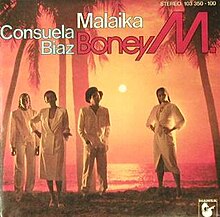Adam Salim
| "Malaika" | ||||
|---|---|---|---|---|
 |
||||
| Single by Boney M. | ||||
| from the album Boonoonoonoos | ||||
| B-side | "Consuela Biaz" | |||
| Released | June 1981 | |||
| Format | 7" single, 12" single | |||
| Recorded | 1981 | |||
| Genre | Pop, Euro disco | |||
| Label | Hansa Records (FRG) | |||
| Producer(s) | Frank Farian | |||
| Boney M. singles chronology | ||||
|
||||
| "Malaika (Lambada Remix)" | ||||
|---|---|---|---|---|
 |
||||
| Single by Boney M. | ||||
| from the album Greatest Hits of All Times - Remix '89 - Volume II |
||||
| Released | October, 1989 | |||
| Format | 7" single, 12" single, CD-single | |||
| Genre | Pop, Euro disco | |||
| Label | Hansa Records (FRG) | |||
| Producer(s) | Frank Farian | |||
| Boney M. singles chronology | ||||
|
||||
Malaika is a Swahili song written by Tanzanian Adam Salim in 1945. This song is possibly the most famous of all Swahili love songs in Tanzania, Kenya and the entire East Africa, as well as being one of the most widely known of all Swahili songs in the world. Malaika in this context means "angel" in Swahili, and this word has always been used by the Swahili speakers to refer to a beautiful girl.
The lyrics of the song differ slightly from version to version; the title itself is subject to variation, such as "Ewe Malaika" or "My Angel".
Authorship of this popular song is still very controversial. However, most people accredit its authorship to Adam Salim, a not-well-published Tanzanian songwriter. Salim (born in 1916) composed this song while he was living in Nairobi between 1945–46. According to this story, Adam Salim composed "Malaika" song in 1945 for his very beautiful girlfriend Halima Ramadhani Maruwa. Their parents disapproved of their relationship, and Halima was forced by her parents to marry an Asian tajir (wealthy man). Fadhili William, a Kenyan singer, is also associated with the song because he is the first person to record it. Producer Charles Worrod provides yet another version, crediting the song to Grant Charo, William's brother-in-law (see Ondevo 2006), a claim which is also associated with the fact that Fadhili William was the first person to record the song. Charo is not known to have confirmed this claim.
Another East African claiming to have written the song is Lucas Tututu from Mombasa.
Although Fadhili William has always insisted on his authorship of "Malaika", even providing a detailed description of the circumstances in which he wrote it, he is only recognized as the composer for royalty purposes. In any case, William was the first to record the song, together with his band The Jambo Boys, in 1960.
It was later re-recorded at Equator Sound Studios by the British-born Kenyan music promoter Charles Worrod, who marketed the ballad to eventually becoming an internationally acclaimed song.
Miriam Makeba's early recording helped make it famous throughout the continent and eventually the world. Her performances of the song brought it to the attention of such famous names as Harry Belafonte, Pete Seeger, Boney M, Usha Uthup and Angélique Kidjo.
...
Wikipedia
